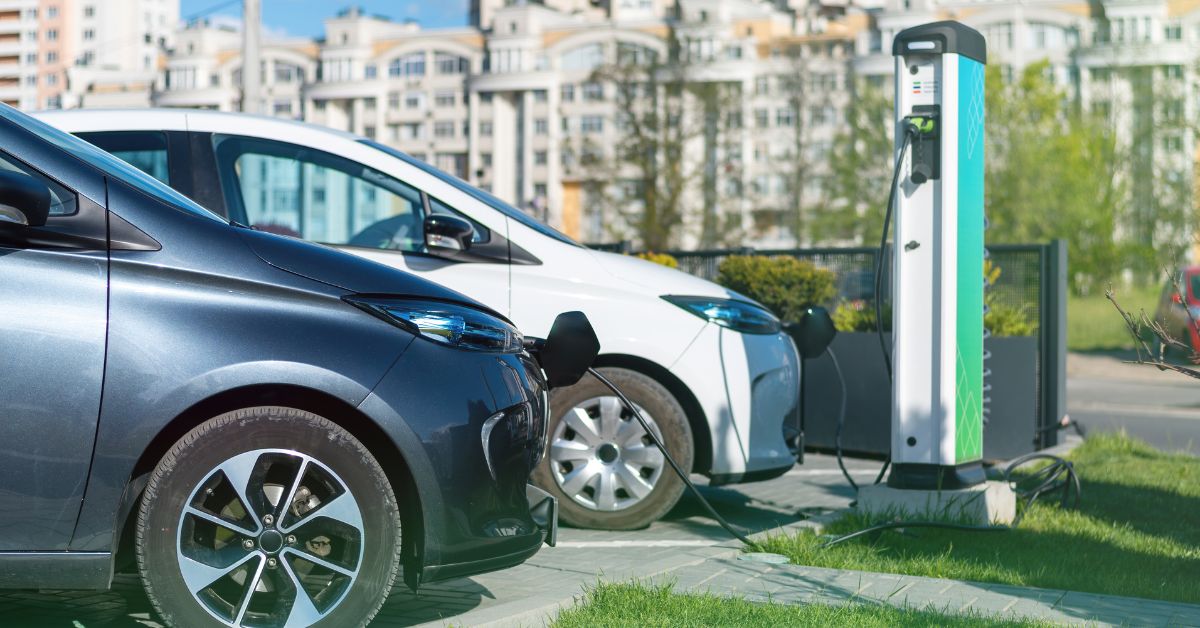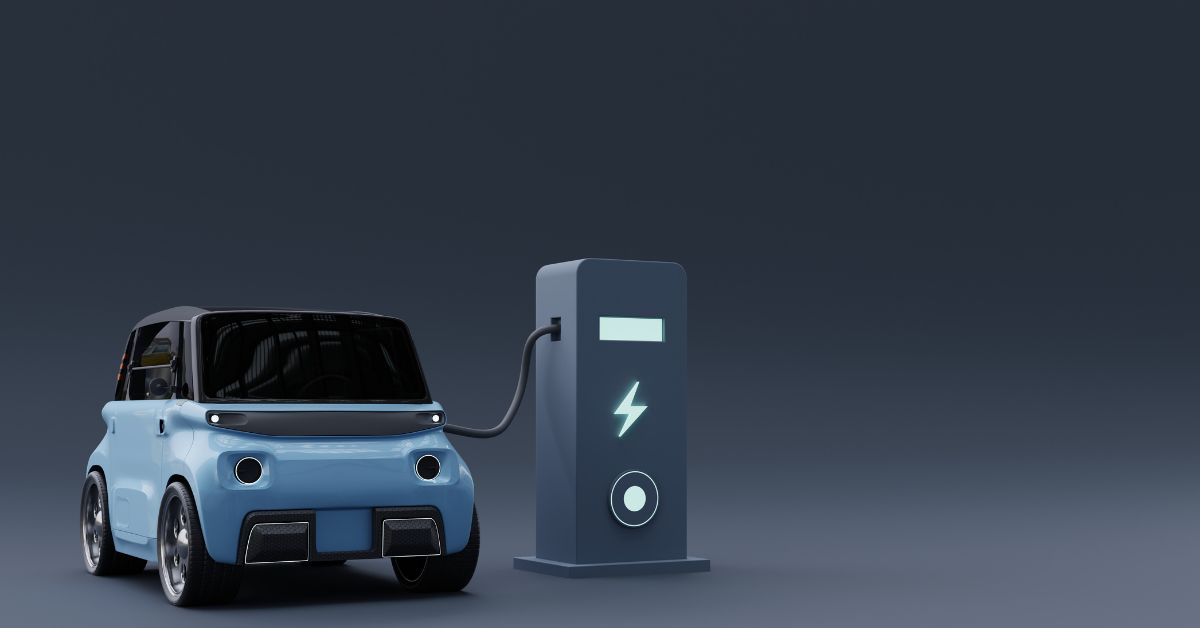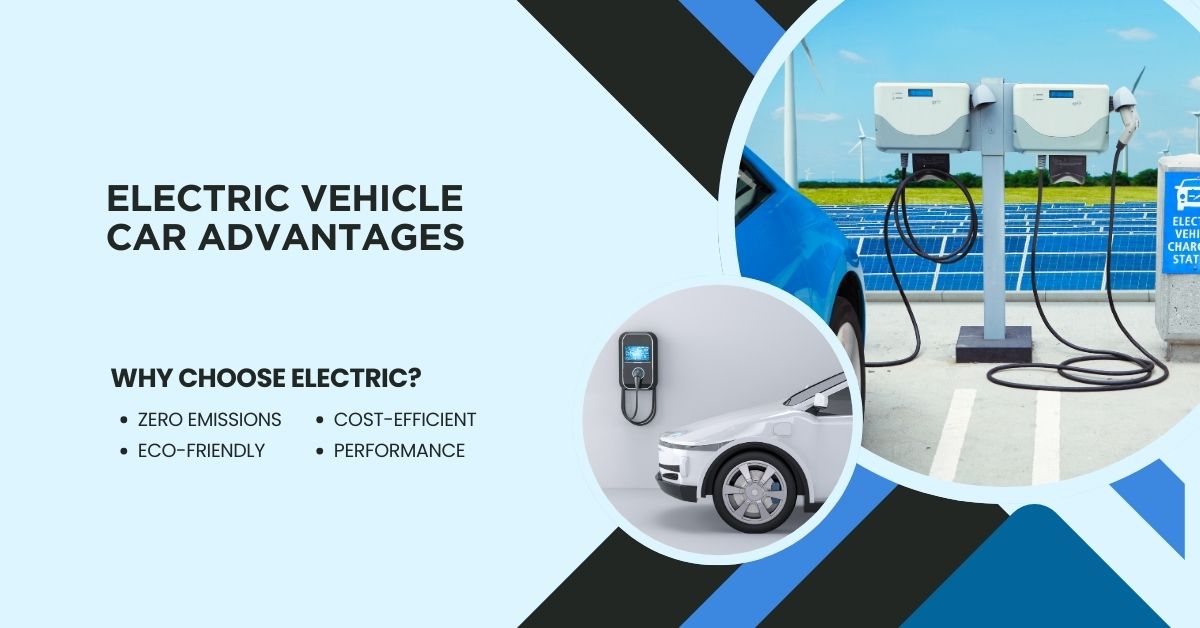Electric Vehicle Car Advantages
Know the details about Electric Vehicle Car Advantages, Electric vehicle (EV) cars offer numerous advantages over traditional petrol and diesel vehicles. They are environmentally friendly, producing zero tailpipe emissions, which helps reduce air pollution and combat climate change.
EVs are also more energy-efficient, converting a higher percentage of energy from the grid to power the wheels. They have lower operating costs, as electricity is generally cheaper than gasoline, and they require less maintenance due to fewer moving parts. EVs offer a quieter, smoother ride with instant torque, providing better acceleration. Additionally, governments often offer incentives and tax benefits for EV ownership, making them financially attractive.
Table of Contents
Electric Vehicle Car Advantages
As the world becomes more conscious of environmental concerns and sustainability, electric vehicles (EVs) are becoming increasingly popular. The shift from traditional gasoline-powered cars to electric vehicles represents a significant technological advancement and a crucial step toward reducing carbon emissions and our dependency on fossil fuels. In this blog post, we will explore the numerous advantages of electric vehicles, breaking them down into categories such as environmental impact, cost savings, convenience, and long-term benefits.
Environmental Impact
Reduction in Carbon Emissions
One of the most well-known advantages of electric vehicles is their ability to reduce carbon emissions. Unlike internal combustion engine (ICE) vehicles that burn gasoline or diesel, EVs run on electricity, which can come from a variety of sources, including renewable energy such as solar, wind, and hydropower. By using electricity instead of fossil fuels, EVs significantly reduce the amount of CO2 and other greenhouse gases released into the atmosphere.

Studies show that electric cars emit significantly fewer emissions over their lifetime compared to traditional vehicles, even when accounting for the emissions from electricity generation. According to the Union of Concerned Scientists, the average of electric car in the U.S. produces less than half the global warming emissions of comparable gasoline-powered vehicles, even when powered by a grid that is only partially renewable.
Improved Air Quality
Electric vehicles help improve air quality, particularly in urban areas where air pollution can be a significant problem. Traditional vehicles emit pollutants such as nitrogen oxides (NOx) and particulate matter (PM) that contribute to smog, respiratory problems, and other health issues. Since EVs have no tailpipe emissions, they help to reduce these harmful pollutants, leading to cleaner air and improved public health.
Cities that have adopted EVs on a large scale, such as Oslo, Norway, have seen a noticeable improvement in air quality. As more cities around the world promote the adoption of electric vehicles, we can expect to see even greater improvements in air quality, benefiting both the environment and human health.
Reduced Noise Pollution
Electric vehicles are also much quieter than traditional vehicles. The electric motor in an EV operates with minimal noise, which means that the sound of traffic is significantly reduced. This is particularly beneficial in densely populated areas where noise pollution can be a serious issue. Reduced noise pollution leads to quieter, more peaceful neighborhoods and a better overall quality of life for residents.
In urban areas, noise pollution has been linked to a variety of negative health outcomes, including stress, sleep disturbances, and even cardiovascular issues. By reducing the noise associated with traffic, electric vehicles contribute to healthier living environments.
Cost Savings
Lower Fuel Costs
One of the most attractive advantages of electric vehicles is the potential for significant fuel cost savings. While gasoline prices can fluctuate, electricity prices are generally more stable and, in many cases, cheaper than gasoline. The cost of electricity per mile for an electric vehicle is often much lower than the cost of gasoline per mile for a traditional vehicle. Studies suggest that driving an EV can cost roughly half as much as driving a gasoline-powered vehicle, depending on local electricity rates and gas prices.
In addition, many EV owners have the option to charge their vehicles at home, which can be even more cost-effective, especially if they take advantage of time-of-use rates or use renewable energy sources such as rooftop solar panels to charge their vehicles.
Reduced Maintenance Costs
Electric vehicles are mechanically simpler than traditional gasoline-powered vehicles. This simplicity translates into lower maintenance costs for EV owners. For example, EVs do not have as many moving parts, such as oil filters, spark plugs, or timing belts, which are common in internal combustion engines and require regular maintenance or replacement. EVs also do not require oil changes, reducing the cost and hassle associated with regular vehicle maintenance.
The regenerative braking system found in many electric vehicles also helps to extend the life of the brake pads, reducing the need for frequent replacements. Overall, EVs have fewer components that can wear out or fail, resulting in lower maintenance and repair costs over the lifetime of the vehicle.
Tax Incentives and Rebates
Many governments around the world offer financial incentives to encourage the adoption of electric vehicles. These incentives can come in the form of tax credits, rebates, reduced registration fees, or exemptions from certain taxes. In the United States, for example, there is a federal tax credit of up to $7,500 for the purchase of a new electric vehicle, and many states offer additional incentives. These incentives can significantly reduce the upfront cost of purchasing an EV, making them more affordable for consumers.
In addition to financial incentives, some governments offer other perks for EV owners, such as access to high-occupancy vehicle (HOV) lanes, free or discounted parking, and exemptions from congestion charges in cities. These benefits can further enhance the appeal of electric vehicles.
Convenience and Driving Experience
Home Charging
One of the biggest conveniences of owning an electric vehicle is the ability to charge the car at home. Unlike traditional vehicles that require trips to the gas station, EV owners can simply plug in their vehicle overnight and wake up to a fully charged battery. This eliminates the need for regular stops at gas stations and makes owning an EV incredibly convenient for daily commuting and short trips.
For those with access to faster home charging stations (Level 2 chargers), charging times can be greatly reduced, allowing for more flexibility. Additionally, advancements in charging technology continue to improve charging speeds, making EV ownership even more convenient.
Public Charging Infrastructure
The public charging infrastructure for electric vehicles is expanding rapidly. Many cities, shopping centers, and workplaces now offer charging stations, making it easier than ever to charge an EV while on the go. Companies like Tesla have built extensive networks of Superchargers, which provide fast charging for long-distance travel.
While concerns about “range anxiety” (the fear of running out of battery while driving) were once a common barrier to EV adoption, the increasing availability of public charging stations, along with improvements in EV range, has greatly alleviated this issue. In many regions, EV drivers can now confidently plan long road trips without worrying about finding a place to charge.
Improved Driving Experience
Electric vehicles offer a unique and enjoyable driving experience. Because EVs have fewer moving parts and no need for a traditional transmission, they provide a smooth, quiet ride with instant torque. This means that acceleration in an EV is often faster and more responsive than in a gasoline-powered vehicle.
Additionally, electric vehicles have a lower center of gravity due to the placement of the battery pack, which improves handling and stability. Many drivers find that EVs are more enjoyable to drive, offering both performance and comfort.
Software and Technological Advancements
Many electric vehicles come equipped with advanced software and technology features. For example, Tesla vehicles are known for their over-the-air software updates, which can improve performance, add new features, and enhance safety over time. These updates allow EV owners to benefit from the latest technology without having to buy a new vehicle.
Electric vehicles are also often equipped with features like advanced driver-assistance systems (ADAS), which can include adaptive cruise control, lane-keeping assist, and automatic emergency braking. These features improve the safety and convenience of driving, making EVs some of the most technologically advanced vehicles on the market.
Long-Term Benefits
Energy Independence
Electric vehicles play a key role in reducing a country’s dependence on foreign oil. By using electricity as a primary energy source, nations can rely more on domestic energy production, especially as renewable energy sources like solar, wind, and hydropower continue to grow. This shift toward energy independence has important geopolitical and economic benefits, reducing the need for oil imports and protecting against volatile global oil prices.

Job Creation in Green Industries
The growth of the electric vehicle industry is creating new job opportunities in green industries. From the manufacturing of EVs and batteries to the installation and maintenance of charging infrastructure, the transition to electric vehicles is driving economic growth in the clean energy sector. In addition, the renewable energy industry, which is closely linked to the success of electric vehicles, is also seeing an increase in job creation as more countries invest in solar, wind, and other renewable energy projects.
Long-Term Cost Savings for Consumers
While the upfront cost of electric vehicles can be a higher than traditional vehicles, the long-term savings on fuel and maintenance often make EVs more cost-effective over time. Studies have shown that the total cost of ownership for an electric vehicle is often lower than that of a gasoline-powered vehicle, especially when government incentives, lower fuel costs, and reduced maintenance expenses are taken into account.
As battery technology continues to improve and economies of scale drive down the cost of manufacturing electric vehicles, it is expected that the price of EVs will continue to decrease, making them even more affordable for consumers.
Supporting the Transition to Renewable Energy
Electric vehicles are a key component of the broader transition to renewable energy. As more people adopt EVs, there is a growing demand for clean electricity to power these vehicles. This demand encourages the expansion of renewable energy infrastructure, leading to increased investment in solar, wind, and other clean energy sources. In turn, the growth of renewable energy helps to further reduce greenhouse gas emissions and combat climate change.
The integration of EVs with renewable energy sources also presents exciting opportunities for energy storage and grid management. For example, EVs with bidirectional charging capabilities can store excess energy from renewable sources and feed it back into the grid when needed, helping to stabilize the energy supply and reduce the reliance on fossil fuels.
Challenges and Future Outlook
Battery Technology and Range
One of the main challenges facing the widespread adoption of electric vehicles is battery technology. While EV ranges have improved significantly in recent years, some consumers still have concerns about range anxiety, especially for long-distance travel. However, advancements in battery technology are rapidly addressing these concerns. New battery chemistries, such as solid-state batteries, promise to increase energy density, reduce charging times, and extend the overall range of electric vehicles.
As battery technology continues to evolve, we can expect to see even more improvements in the range and performance of electric vehicles, making them an even more attractive option for consumers.
Charging Infrastructure Expansion
While the public charging infrastructure for electric vehicles is expanding, there is still work to be done to ensure that charging stations are widely available and accessible. In many regions, particularly rural areas, the lack of charging stations can be a barrier to EV adoption. Governments and private companies are investing heavily in building out charging networks, and with continued expansion, this issue is expected to be resolved in the coming years.
Recycling and Disposal of Batteries
As the number of electric vehicles on the road increases, there is a growing need to address the recycling and disposal of EV batteries. Lithium-ion batteries, which are commonly used in electric vehicles, contain valuable materials such as lithium, cobalt, and nickel that can be recycled. However, the infrastructure for recycling these batteries is still in its early stages.
Research is underway to develop more efficient and environmentally friendly methods of recycling EV batteries, and some companies are already working to repurpose used batteries for energy storage applications. As the electric vehicle industry continues to grow, addressing the recycling and disposal of batteries will be an important aspect of sustainability.
The Future of Electric Vehicles
The future of electric vehicles looks incredibly promising. With advancements in battery technology, expanding charging infrastructure, and growing consumer demand, EVs are poised to become the dominant form of transportation in the coming decades. Automakers around the world are investing heavily in electric vehicle development, with many companies announcing plans to phase out gasoline-powered cars entirely in favor of electric models.

As the world transitions to cleaner, more sustainable transportation, electric vehicles will play a central role in reducing greenhouse gas emissions, improving air quality, and promoting energy independence. The advantages of electric vehicles are clear, and as the technology continues to evolve, the benefits will only become more pronounced.
FAQs About Electric Vehicle Car Advantages
Q1. What are the main advantages of electric vehicles (EVs) over traditional petrol/diesel cars?
EVs offer numerous benefits, including lower running costs, reduced carbon emissions, improved energy efficiency, and quieter operation. Additionally, they have fewer moving parts, leading to less maintenance.
Q2. How do electric vehicles contribute to environmental sustainability?
EVs produce zero tailpipe emissions, helping reduce air pollution and greenhouse gases. When powered by renewable energy, they have an even lower environmental footprint compared to fossil-fuel-powered vehicles.
Q3. Are electric vehicles cheaper to maintain than petrol or diesel cars?
Yes, EVs have fewer mechanical components, such as no exhaust system or engine oil changes, resulting in lower maintenance costs over time. Electric motors are also more reliable and durable.
Q4. What are the cost-saving benefits of owning an electric vehicle?
Besides lower maintenance costs, EVs are cheaper to run due to lower electricity costs compared to fuel prices. Some governments also offer tax incentives, rebates, or discounts for EV owners, further reducing overall expenses.
Q5. Can EVs offer similar performance to petrol-powered cars?
Yes, many EVs provide instant torque and smooth acceleration, resulting in impressive performance. Some high-end electric cars can even outperform their petrol counterparts in terms of speed and handling.
Q6. How long can I drive an electric vehicle on a single charge?
EVs have varying ranges depending on the model, with many modern electric cars offering ranges from 200 to over 400 kilometers on a full charge, which is suitable for most daily commutes.
Q7. What are the advantages of charging an electric vehicle at home?
Charging at home is convenient and typically costs less than public charging stations. Home charging allows you to start each day with a full battery, reducing the need to visit gas stations.
Q8. How does owning an electric vehicle benefit my long-term finances?
Although EVs might have higher upfront costs, the long-term savings from lower fuel, maintenance, and tax incentives often outweigh the initial investment. The cost per kilometer is also significantly lower for EVs compared to petrol cars.
Q9. Are electric vehicles safer than traditional cars?
EVs are equipped with advanced safety features, including lower centers of gravity due to the battery placement, reducing the risk of rollovers. Additionally, they pass the same safety tests as petrol cars and include features like regenerative braking that enhances safety.
Q10. How does driving an electric vehicle improve the driving experience?
EVs provide a quieter and smoother ride since electric motors produce less noise and vibrations. Many drivers also appreciate the regenerative braking feature, which captures energy while slowing down, further improving efficiency.
The advantages of electric vehicles are numerous and far-reaching. From reducing carbon emissions and improving air quality to offering cost savings and a superior driving experience, EVs represent a transformative shift in the way we think about transportation. As technology continues to advance and the world becomes more committed to sustainability, electric vehicles will undoubtedly play a critical role in shaping a cleaner, greener future for all.
Click here to learn more about Electric Vehicle Car Advantages
